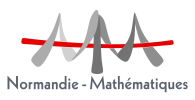 Français
Français English
English
GdTProbaTESD20190701
Invariant measures, matching and the frequency of 0 for signed binary expansions
Salle de séminaire M.0.1
(Utrecht, Pays-Bas)
We introduce a parametrised family of maps $\{S_{\eta}\}_{\eta \in [1,2]}$, called symmetric doubling maps, defined on $[-1,1]$ by $S_\eta (x)=2x-d\eta$, where $d\in \{-1,0,1 \}$. Each map $S_\eta$ generates binary expansions with digits $-1$, 0 and 1. We study the frequency of the digit 0 in typical expansions as a function of the parameter $\eta$. The transformations $S_\eta$ have a natural ergodic invariant measure $\mu_\eta$ that is absolutely continuous with respect to Lebesgue measure. The frequency of the digit 0 is related to the measure $\mu_{\eta}([-\frac12,\frac12])$ by the Ergodic Theorem. We show that the density of $\mu_\eta$ is piecewise smooth except for a set of parameters of zero Lebesgue measure and full Hausdorff dimension and give a full description of the structure of the maximal parameter intervals on which the density is piecewise smooth. We give an explicit formula for the frequency of the digit 0 in typical signed binary expansions on each of these parameter intervals and show that this frequency depends continuously on the parameter $\eta$. Moreover, it takes the value $\frac23$ only on the interval $\big[ \frac65, \frac32\big]$ and it is strictly less than $\frac23$ on the remainder of the parameter space.
This is joint work with Charlene Kalle.




